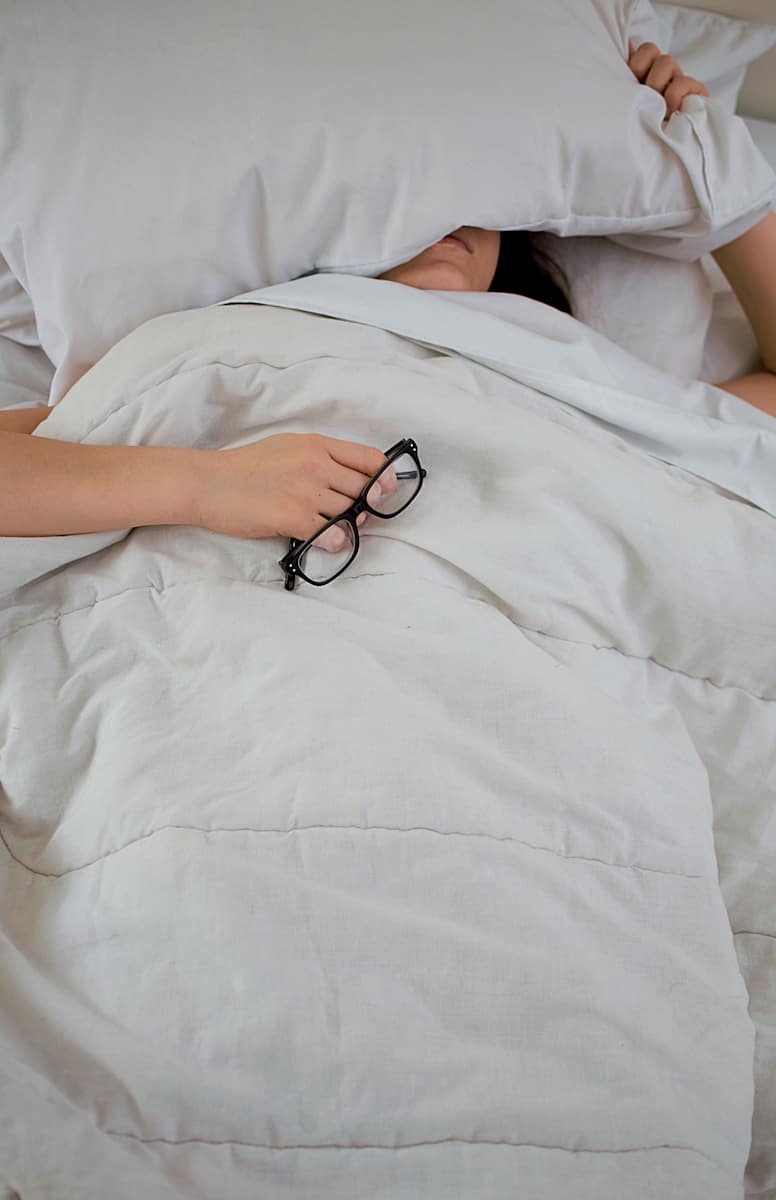
Your Nervous System Might Be Stuck in High Gear
Your body has two main modes: “go” mode (your sympathetic nervous system) and “rest” mode (your parasympathetic nervous system). If you’re feeling exhausted but still wired at night, it’s a sign your nervous system hasn’t fully shifted into the relaxed state that allows for deep sleep. This can happen for a lot of reasons—stress, caffeine too late in the day, or even scrolling your phone right before bed—but the bottom line is, your body won’t sleep deeply if it still thinks it needs to be on high alert.
Instead of forcing yourself to sleep, try helping your body shift into relaxation first. Breathwork, a warm bath, or even lying on the floor with your legs up the wall can all activate your parasympathetic nervous system and gently nudge your body back into “rest” mode. This is way more than “tips for getting better sleep” advice—it’s about training your body to feel safe enough to fully let go.
Your Circadian Rhythm Needs a Reset
Your sleep cycle isn’t just about when you go to bed—it’s tied to your entire day. If you’re waking up exhausted, struggling to fall asleep, or feeling groggy no matter how much rest you get, your circadian rhythm might be out of sync. This internal clock runs on cues from light, movement, and food, and when those signals are off, your sleep can suffer.
One of the simplest ways to reset it? Get natural sunlight first thing in the morning. Even five to ten minutes of morning light exposure helps regulate melatonin production, making it easier to fall asleep at night and wake up feeling refreshed. Pairing this with consistent meal times and movement during the day can also reinforce a stronger, more predictable sleep cycle.
Light Therapy Glasses Can Help Retrain Your Sleep Patterns
If your schedule doesn’t always allow for natural light exposure, light therapy glasses can be a game-changer. These glasses use targeted light wavelengths to mimic natural sunlight, helping regulate your circadian rhythm, improve energy levels, and make it easier to fall asleep at night. They’re especially helpful if you deal with seasonal changes, travel frequently, or work odd hours that throw off your body’s natural light exposure.
Noteworthy brands like Sula, Pocket Sky and AYO light therapy glasses have designed sleek, wearable options that make it easy to get the light your body needs without having to rearrange your whole schedule. Many users notice improvements in sleep quality, mood, and focus within just a few days of consistent use. If your sleep struggles stem from an irregular light schedule, this small shift can make a massive difference.
Your Blood Sugar Levels Are Impacting Your Sleep
Waking up in the middle of the night, especially around 2-4 a.m., can sometimes be linked to blood sugar dips. When your blood sugar crashes overnight, your body releases cortisol and adrenaline to bring it back up—and that jolt of stress hormones can be enough to wake you up.
Balancing blood sugar isn’t just about what you eat—it’s also about when. Eating a balanced dinner with protein, healthy fats, and fiber can help stabilize blood sugar through the night. If you find yourself waking up hungry or restless, a small snack with protein (like almond butter on a slice of apple) before bed can sometimes help keep blood sugar steady until morning.
Overthinking Sleep Can Keep You Awake
Ever lay in bed stressing about how many hours of sleep you’ll get if you just fall asleep right now? Sleep anxiety itself can be enough to keep you up. The more you try to force sleep, the harder it becomes, creating a frustrating cycle where you’re exhausted but too alert to rest.
Instead of pressuring yourself to sleep, try reframing the way you approach it. Think of nighttime as a chance to rest rather than a test of how quickly you can fall asleep. If you don’t drift off right away, remind yourself that even lying in bed with your eyes closed is still restorative. Letting go of the pressure to sleep can actually help your body relax enough to make it happen naturally.
The Final Word
Your body is wired for sleep—it knows how to rest deeply when it’s given the right conditions. Instead of looking for another trick or shortcut, focus on removing the things that are interfering with your natural rhythm. Supporting your nervous system, getting the right kind of light exposure, keeping blood sugar balanced, and letting go of sleep anxiety can all help your body get back to doing what it’s meant to do. Sleep should feel easy—because at its core, it is.






